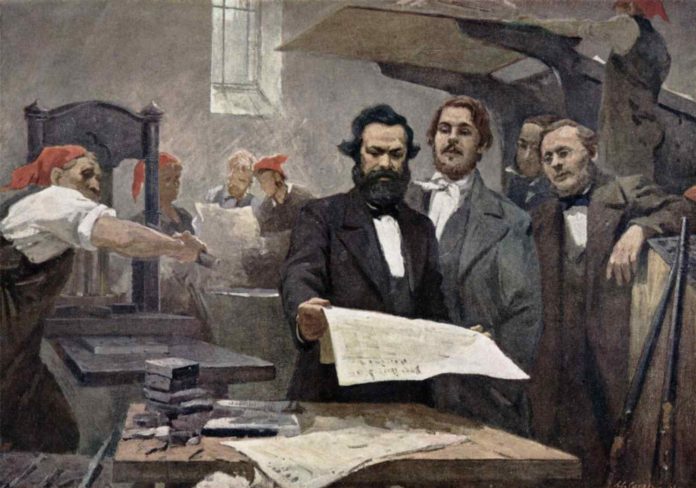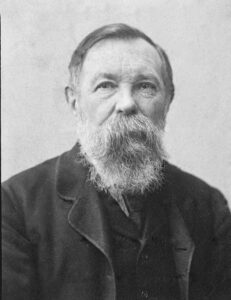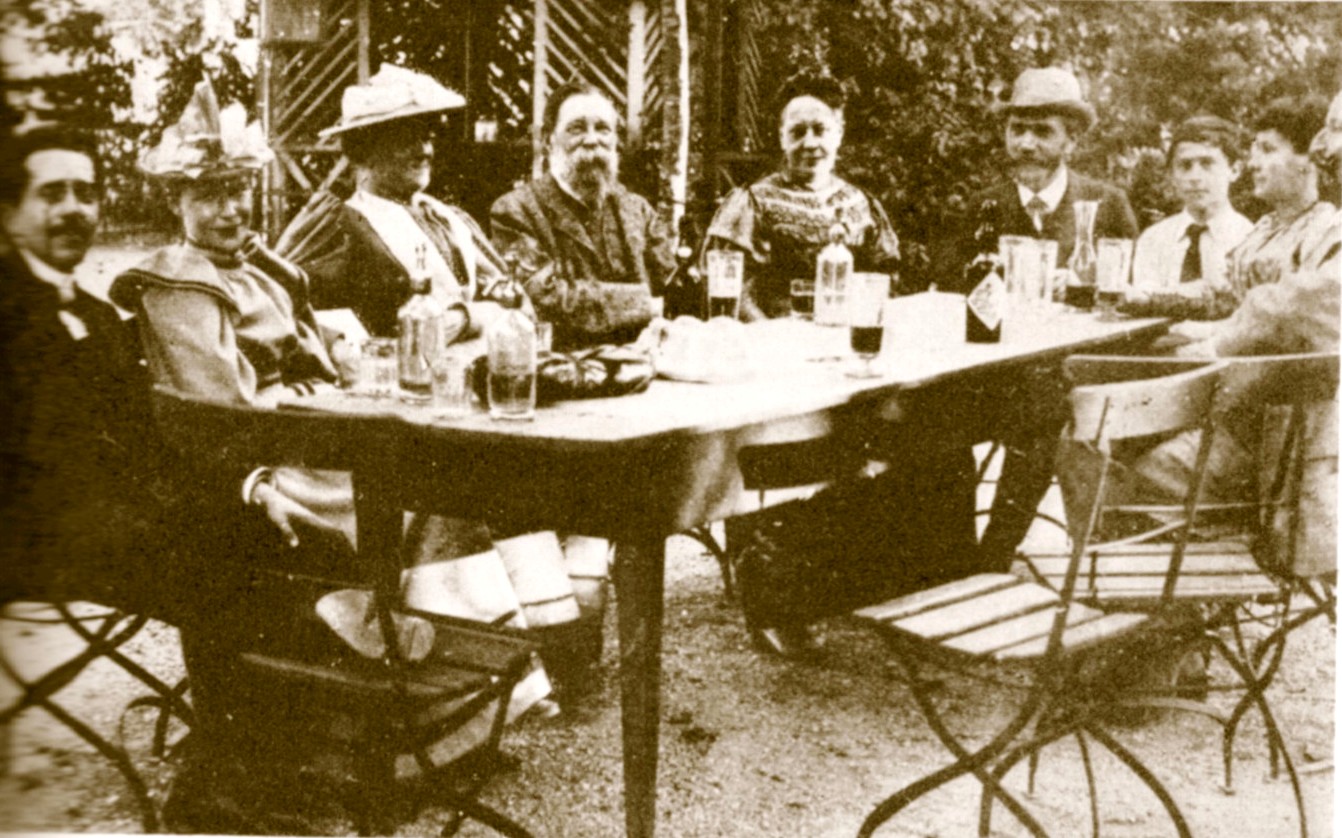
Socialistisk Biblioteks Tidslinje med links til begivenheder og personer i 1820.
Se også Index over personer, organisationer/partier og værker (som bøger, malerier, mm.), steder, begivenheder, mv., der er omtalt på hele Tidslinjen, titler og indhold på emnelisterne osv.
[sta_anchor id=”1820xxxx” /]
1820 ??
Den amerikanske abolitionist, aktivisten Harriet Tubmans fødes i Dorchester County, Maryland på et tidspunkt mellem 1820-22. (Dør i Auburn, New York, 10. marts 1913, for links se denne dato).
[sta_anchor id=”18201128″ /]
28. november 1820

Friedrich Engels fødes i Barmen i Tyskland. (Dør 5. august 1895 i London).
Leksikalt:
- Engels, Friedrich. Af Jon Elster (Leksikon.org)
- Friedrich Engels (Denstoredanske)
- Friedrich Engels (Wikipedia.org)
- Friedrich Engels. By Jairus Banaji (Historical Materialism; online at Internet Archive)
Sites:
- Friedrich Engels (Marxisme Online). Tekster online på dansk.
- Karl Marx – Friedrich Engels (Marxistisk Internet Arkiv, Dansk afdeling). Tekster online på dansk.
- Friedrich Engels (Marxistiske Klassikere). Tekster, biografier og billedgalleri.
- Friedrich Engels (The History of Economic Thought). With his major works.
- Friedrich Engels Bicentennial (Marxists Internet Archive, November 2020; online at Marxists Internet Archive). Images of Friedrich Engels, Recollections by people who know him, Biographies, On Engels’ contributions and Some of Engels’ writings.
- Marx & Engels Internet Archive (Marxists Internet Archive). Med Date index, Subject index, Multi-lingual index, Collected works, Selected Works, Biographies, Image gallery, First International and Letters.

Artikler:
Engels og den marxistiske økonomi. Af Mathias Bismo (Solidaritet.dk, 15. april 2021). “I forbindelse med markeringen af Friedrich Engels’ 200-årsdag forrige efterår, udgav Michael Roberts bogen Engels 200. Bogen er ikke primært en biografi over Engels’ liv, men snarere en biografi over hans bidrag til dét, vi i dag kender under betegnelsen ‘marxistisk økonomi’. Og det var ikke noget lille bidrag.” Se andre anmeldelse mv. nedenfor.
Uden Engels – ingen Marx. Af Gerd Callesen (Arbejderen.dk, 27. november 2020). “I vurderingen af Marx og Engels må man gøre sig klart, at de to hverken var siamesiske tvillinger, eller at den ene frit kunne udveksles med den anden. Der var tale om to selvstændige personer, der begge på afgørende vis har bidraget til udviklingen af en kritisk teori.”
Friedrich Engels og dansk arbejderbevægelse. Af Gerd Callesen (Arbejderen.dk, 27. november 2020). “I 1872 overtog Engels hvervet som kontaktperson til Den Internationale Arbejderforening for Danmark. Han havde den fordel at kunne læse og til en vis grad også skrive på dansk.”
Friedrich Engels’ rolle i den internationale arbejderbevægelse. Af Gerd Callesen (Solidaritet, nr.2, juni 2000, s.30-39; online på Internet Archive). “I det årti, der lå mellem Marx’ og Engels’død, bestræbte Engels sig, med et vist held, på at overvinde de forskellige ikke-marxistiske tendenser i arbejderbevægelsen.” Noter/litteratur mangler i online-udgave.
Radio:
Friedrich Engels 200 år (Lørdag formiddag, Oktober Radio Århus, 28. november 2020, 43:09 min.)
Articles:
The Life, Work and Legacy of Friedrich Engels: Emerging from Marx’s Shadow. By Palle Rasmussen (Marx & Philosophy Review of Books, 22 September 2023). Review of Eberhard Illner, Hans A Frambach and Norbert Koubek’s book (eds.) (Bloomsbury Academic, 2023, 343 p.). “The eleven chapters (supplemented by an introduction and a concluding overview) contribute substantial research on Engels’ career and writings, seen partly in the context of his collaboration with Marx, but mainly in the broader context of social developments and knowledge production during Engels’ lifetime.” See also review by Lindsay German (Counterfire, 28 April 2023).
The first Marxist? By Bruce McFarlane (Monthly Review, Vol.75, No.4, September 2023). “In the history of Marxism since Karl Marx’s death, Frederick Engels has cut a controversial figure across the centuries. Through an examination of their correspondence and collaborations, McFarlane presents Engels as not only a stalwart friend and colleague to Marx, but a fascinating organizer, editor, and strategist in his own right.”
Engels’s ecologically indispensable if incomplete dialectics of nature. By Paul Blackledge (Monthly Review, Vol.72, No.11, April 2021). Review of Kaan Kangal, Friedrich Engels and the Dialectics of Nature (Palgrave Macmillan, 2020, 213 p.). “Kangal has made an important contribution to this project and it behooves us to read his work to help overcome the remaining lacunae in Engels’s thought as part of the struggle for a coherent ecological alternative to capitalism’s destruction of our environment.” See also review by Vesa Oittinen (Marx & Philosophy Review of Books, 15 December 2020) + review by Cammilla Royale: Engels: the enemy within? (International Socialism, Issue 172, Autumn 2021).
The Return of Nature: Socialism and Ecology. By Dominic Alexander (Counterfire, April 22, 2021). Review of John Bellamy Foster’s book (Monthly Review, 2021, 687 p.). “The centrality of Engels to these arguments means that his work takes up the central portion of The Return of Nature.”
See also review by Paul Vernadsky: The invention of tradition on Marxist ecology (Solidarity & Workers’ Liberty, Issue 619, 12 January 2022). “The book is well written, informative, readable and advances our understanding in many respects. However it is flawed in a crucial sense: its proports to invent a tradition of ecological Marxism that ignores the damaging effects of Stalinism …”
A well-tuned fiddle (Socialist Review, Issue 464, January 2021). “Camilla Royle addresses the claim that Friedrich Engels, far from being Karl Marx’s key collaborator, held fundamentally different philosophical positions that distorted Marx’s revolutionary conclusions.”
Engels 200 – His Contribution to Political Economy. By John Clarke (Counterfire, December 29, 2020). Review of Michael Roberts’ book (Lulu.com, 2020, 172 p.). “The central importance of the revolutionary Friedrich Engels to Marxism, as an individual thinker as well as collaborator, is forcefully argued in Roberts’ Engels 200.” See also interview with Michael Roberts: Happy Birthday, Friedrich Engels (Jacobin, November 28, 2020).
See extraxts from the book: The Engels pause (Weekly Worker, Issue 1291, 19 March 2020) + Nature and humanity (Ibid., Issue 1294, 9 April 2020).
Engels against reformism in Germany and France. By Doug Enaa Greene (Left Voice, November 28, 2020). “Friedrich Engels was born 200 years ago today. Modern reformists like to cite Engels as an authority. But until his very last day, Engels fought against reformist ideas and for revolutionary principles.”
Friedrich Engels was more than second fiddle to Karl Marx. By Marcello Musto (Jacobin, November 28, 2020). “Friedrich Engels once wrote that he played ‘second fiddle’ to Marx. On the 200th anniversary of his birth, we should remember the profound influence that Engels had on his friend and comrade, as well as his own theoretical contributions.”
Friedrich Engels, a thinker for today. By Peter Schadt and Hans Zobel (Jacobin, November 28, 2020). “Two hundred years since his birth, Friedrich Engels is often considered a man rooted in the culture of 19th-century thought. But if not all his predictions ring true, his critique of the rising industrial capitalism offers penetrating insights into our own present.”
In working-class Manchester, Friedrich Engels became a revolutionary. By Brian Coney (Jacobin, November 28, 2020). “Friedrich Engels was just 22 when he was sent to England to help run the family firm. His father hoped this would draw him away from radical ideas — but in industrial Manchester, young Friedrich instead saw the suffering, and the power, of a growing working class.”
Engels—200 years on (Socialist Worker, Issue 2733, 28 November 2020). “Two centuries after the birth of revolutionary and socialist theorist Frederick Engels, Sarah Bates examines a life and legacy that goes beyond collaborating with Karl Marx.”
Engels still lives at 200. By Ariane Diaz (Left Voice, November 28, 2020). “Today marks 200 years since the birth of Friedrich Engels, the revolutionary leader who, side by side with Marx, elaborated a good part of what we know today as the theoretical bases of Marxism and built the first international organizations of ‘insurrectionist wage slaves’ who adopted communism as the name for their objective.”
Being Friedrich Engels. By Matthew E. Strauss (New Politics, November 28, 2020). Review of Terrell Carver, Engels Before Marx (Palgrave Macmillan, 2020, 111 p.). “Carver’s treatment of Engels in this work ends at 1844. He does not address the nature of Marx and Engels’ partnership, which he has discussed elsewhere, though a careful reader may find an allusion to his earlier views.” See extract from the book: What Engels gave to Marx and Marxism (Jacobin, November 28, 2020).
200 years since the birth of Friedrich Engels. By Peter Schwarz (World Socialist Web Site, 28 November 2020). “Together with his friend Karl Marx … Engels co-founded scientific socialism. Two hundred years later, their life’s work is of burning contemporary relevance. They were much more farsighted than the countless academics who have filled entire libraries with their attempted refutations of Marxism.” See also topic page: Frederich Engels (Ibid.).
Frederick Engels: 200 years since his birth (In Defense of Marxism, 27 November 2020). “Rob Sewell commemorates this bicentenary by looking at the vital contribution that Engels made to developing the ideas of Marxism, for which we owe him an enormous debt of gratitude.”
Friedrich Engels at 200: a revolutionary historian. By Christian Hogsbjerg (History Workshop, November 23, 2020). “The German revolutionary philosopher made pathbreaking and profound contributions to modern social and political theory, playing a critical role in the forging and development of classical Marxism.”
Engels’s Dialectics of Nature in the Anthropocene. By John Bellamy Foster (Monthly Review, Vol.72, No.6, November 2020). “Today, two hundred years after his birth, Engels can be seen as one of the foundational ecological thinkers of modern times.”
Engels’s emergentist dialectics. By Kaan Kangal (Monthly Review, Vol.72, No.6, November 2020). “For varied reasons and on various occasions, contemporary natural scientists and philosophers, Marxist and non-Marxist alike, have expressed their admiration for Frederick Engels, the cofounder of dialectical materialism and scientific socialism.”
Making an ecological worldview. By Martin Empson (International Socialism, Issue 167, Summer 2020). Review of John Bellamy Foster, The Return of Nature: Socialism and Ecology (Monthly Review Press, 2020). “The work of Engels is a key part of The Return of Nature. Foster examines how issues of ecology (in their broadest sense) were key to his writing.”
Friedrich Engels and his contribution to Marxism. By Stavros Mavroudeas (Human Geography, Vol.13, No.2, 2020; online at Antiper.org). “The evidence presented by the new anti-Engelsionists is flimsy and essentially philological hair-splitting arguments. The common ground uniting them is their abhorrence for the existence of Marxism as a coherent theoretical tradition and as a weapon for the revolutionary struggle of the working class for the emancipation of human society.”
Engels’s second theory: technology, warfare and the growth of the state. By Wolfgang Streeck (New Left Review, Issue 123, May-June 2020, p.75-88). “The author of Buying Time detects a state-political supplement to Marxian social theory in Engels’s analyses of 19th-century militarism. The interplay of modes of production and destruction, class struggle and international warfare, from the Crimea to the War on Terror.”
Engels vs. Marx?: Two hundred years of Frederick Engels. By Paul Blackledge (Monthly Review, Vol.72, No.1, May 2020). “Over the course of the twentieth century, a growing number of commentators have claimed that Engels fundamentally distorted Marx’s thought, and that ‘Marxism’ and especially Stalinism emerged out of this one-sided caricature of Marx’s ideas.”
Friedrich Engels and Modern Social and Political Theory. By Kaar Kangal (Marx & Philosophy Review of Books, 1 April 2020). Review of Paul Blackledge’s book (State University of New York Press, 2019, 278 p.). “Someone had to write this book, and I am glad that Paul Blackledge wrote it. Celebrating the bicentenary of Friedrich Engels birth, monographs of this sort are more than welcome.”
The Engels pause. By Michael Roberts (Weekly Worker, Issue 1291, 19 March 2020). “Below is a short (rough) extract from my upcoming book on the contribution that Engels made to Marxian political economy.” See another extract: Nature and humanity (ibid., Issue 1294, 9 April 2020). “Did Engels really seek to water down Marx’s concern for the environment?” Republished at Counterfire (April 4, 2020).
Engels 200 (Counterfire, February-November 2020; online at Internet Archive). Articles by Lindsey German, Tony Cliff, Elaine Graham-Leigh, Michael Roberts and John Rees.
Engels showed how humans change the world (Socialist Worker, Issue 2687, 14 January 2020). Review of A Rebel’s Guide to Friedrich Engels (Bookmarks, 2020, 64 p.). “Gabby Thorpe is impressed by Camilla Royle’s new book on the life and work of Engels—a key contributor to Marxism.”
Engels’s Politics: strategy and tactics after 1848. By Paul Blackledge (Socialism and Democracy, Vol.33, No.2, July 2019). “My aim is to show both that the label insurrectionary fails adequately to capture his political perspectives over this period, but that his various tactical interventions over these decades were always framed against a broader revolutionary strategy of working-class self-emancipation.”
The return of Engels. By John Bellamy Foster (Jacobin: Reason in Revolt, 28 November 2016). “On the occasion of his birthday, let’s celebrate the incredible contributions of Marx collaborator Friedrich Engels.” See revised edition (Monthly Review, Vol.68, No.10, 2017).
Engels revisited (Socialist Review, Issue 378, March 2013). “There has been a recent resurgence in writers about women’s oppression looking to Marx and Engels for answers, with some arguing he crudely emphasised class at the expense of oppression. Here, Sally Campbell looks at the claims of those writers and defends Engels from the critics.”
Engels’s contradictions: a reply to Tristram Hunt. By Roland Boer (International Socialism, Issue 133, Winter 2012).
Review by John Ehrenberg (Logos: A Journal of Modern Society and Culture, Vol.10, No.3, 2011).
An Engels for the bourgeoisie. By Katherine Connelly (International Socialism, Issue 124, Autumn 2009).
Review by Ian Birchall (Socialist Review, Issue 336, May 2009).
Engels on revolutionary tactics, 1889–1895. By Gerd Callesen (Socialism and Democracy, Vol.26, No.1, 2012, p.85-102). “In the recently published MEGA2 volumes (I/30 to I/32), we find all of Engels’ texts from the period after Marx’s death except for his work on Capital.”
The ‘grand old man’s’ revolutionary legacy. By Philip Wade (A World to Win, 2008). Review of John Green’s Engels: A Revolutionary Life (Artery Publications, 2008, 347 p.). “[The book] is both well written and a joy to read and will appeal to a wide readership.”
Engels: A Revolutionary Life. By Peter Taaffe (The Socialist Party, 4 June 2008). Review of John Green’s book (Artery Publications, 2008). “John Green is to be commended for bringing Engels, one of the greatest figures in human history, to life for modern readers.”
Frederick Engels: theorist and fighter. By Simon Basketter (Socialist Worker, Issue 2105, 14 June 2008). “Sometimes Frederick Engels is seen simply as Karl Marx’s lieutenant, but he was a great socialist activist and thinker in his own right.”
The environmental conditions of the working class: an introduction to Selections from Frederick Engels’s The Condition of the Working Class in England in 1844 (pdf). By Brett Clark and John Bellamy Foster (Archives of Organizational and Environmental Literature, Vol.19, No.3, 2006, p.375-388; online at Johnbellamyfoster.org). “Engels provided a walking tour of the environmental conditions in the manufacturing establishments and slums of the factory towns of England, together with a similar view of London.”
Engels: theorist of war, theorist of revolution. By Gilbert Achcar (International Socialism, Issue 97, Winter 2002, p.69-89). “… looking back to the debates of the Second International and the writings of Frederick Engels.”
Engels. By Tony Cliff (Marxists Internet Archive). Talk given at Marxism 1996 conference: “He was more than a second fiddle to Marx, and I will argue that he made a massive contribution, which added greatly to Marxism, and that he did this often independently of Marx and before Marx.”
Special issue: The revolutionary ideas of Frederick Engels (International Socialism, Issue 65, December 1994, 216 p.). See review by Pete Morgan: Marx’ other half (Socialist Review, Issue 181, December 1994).
- Lindsey German’s Frederick Engels: life of a revolutionary introduces readers to the events which shaped Engels and his ideas.
- John Rees’ Engels’ Marxism replies to those who accuse Engels of distorting Marx’s ideas and of laying the foundations of reformism and Stalinism.
- Chris Harman’s Engels and the origins of human society looks at Engel’s work on human evolution, the rise of class society and the roots of women’s oppression.
- Paul McGarr’s Engels and natural science examines scientific development against the background of Engels’ ideas.
Se også på Socialistisk Bibliotek om Engels’ ‘Naturens dialektik’ (1875-76)** på linksamlingen: Marx og Engels – og miljøet
** Se: Indledning til ‘Naturens dialektik’ af Fr. Engels: online på Marxisme.dk (ca.18 sider).
I Anledning af 30-Årsdagen for Friedrich Engels Død (1925). Af Karl Kautsky (Marxisme Online).
Video:
Engels at 200 (Historical Materialism, 7 November 2020, 1:53 hour; online at YouTube). Michael Roberts about Engels and the Dialectics of Nature; Camilla Royle about Engels and Ecology The Urban Political Ecology of Friedrich Engels.
Condition of the Working Class in England. A documentary film by Deidre O’Neill and Mike Wayne (82 min.) based on the book by Frederick Engels (site). See review by Mark Boothroyd (LeftUnity, 19 June 2013).
Se også på Socialistisk Bibliotek:
- Emneoversigten: Marxisme / Marxism
- Linkboxen: Familiens, Privatejendommens og Statens Oprindelse, 1884, om Engels’ bog.
- Linkboxen: Karl Marx 200, om Marx-debat 200 efter fødslen.
- Tidslinjen: 5. maj 1818, om Karl Marx.































